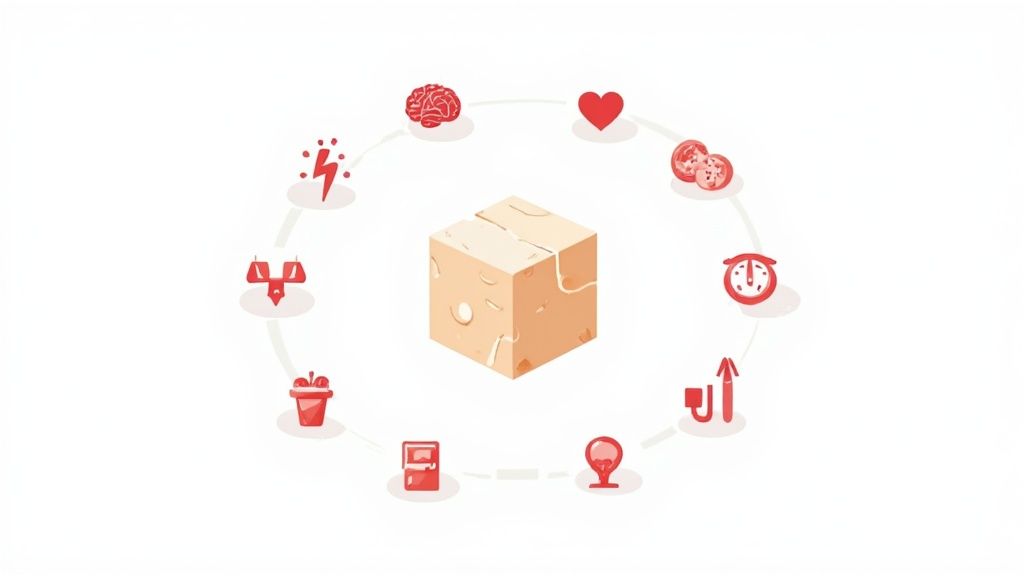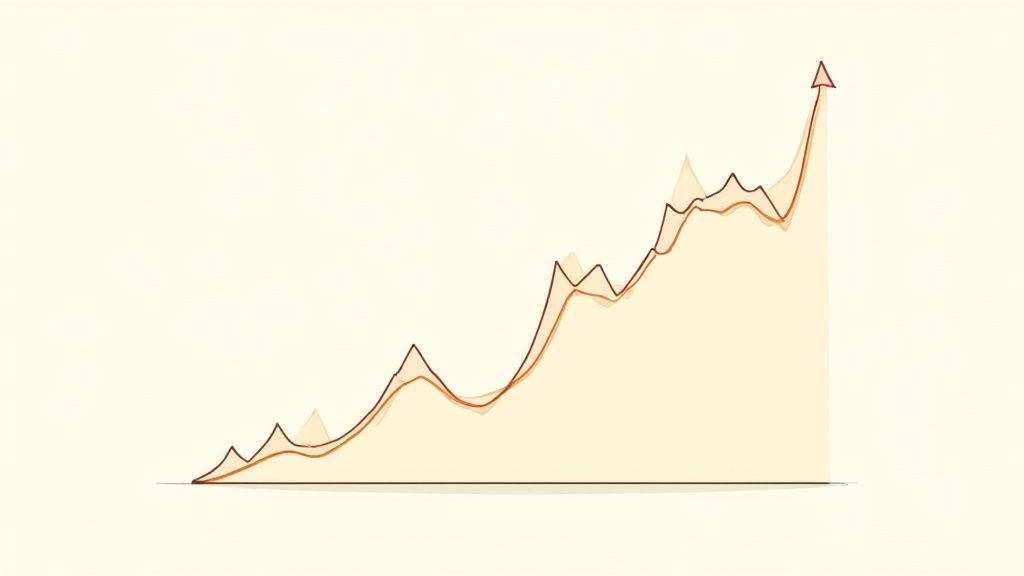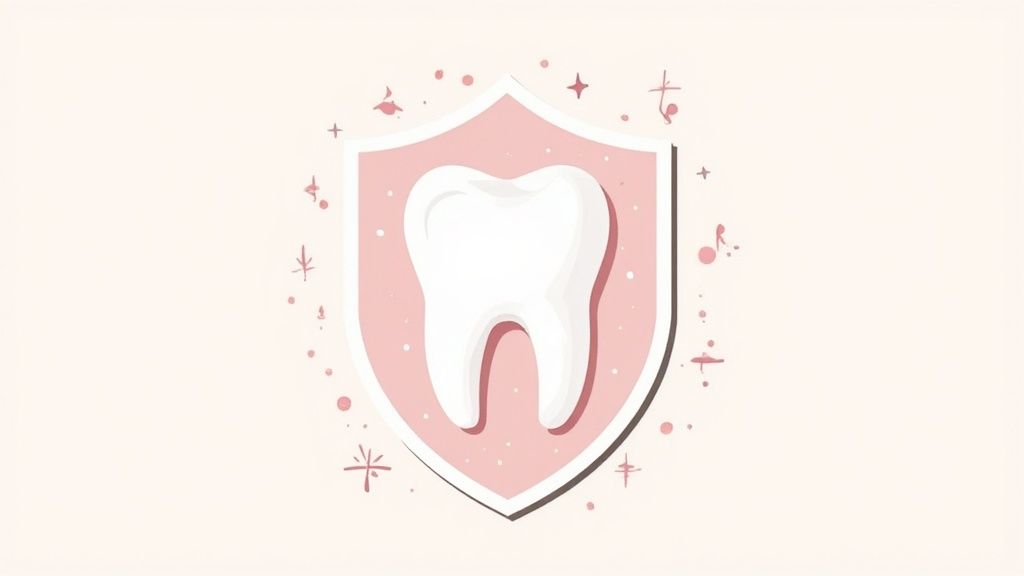8 Life-Changing Benefits of Cutting Sugar in 2025

In a world filled with processed foods, sugar has become a constant companion. It’s in our coffee, our sauces, and even our so-called 'healthy' snacks. But what if stepping away from this sweet temptation could unlock a level of health and vitality you never thought possible? The journey to reduce sugar isn't just about losing weight; it's a comprehensive upgrade for your entire well-being, transforming everything from your physical energy to your mental sharpness.
The benefits of cutting sugar are profound and far-reaching, and this guide is designed to be your definitive roadmap. We will explore eight of the most impactful changes you can expect when you lower your sugar intake. You'll learn how to achieve stable energy levels, clearer skin, and a stronger immune system, among other powerful advantages.
We'll move beyond generic advice, diving straight into actionable strategies, real-world examples, and the science behind why less sugar truly means more life. Each point will provide you with the specific knowledge and practical steps needed to reclaim your health and break free from the cycle of sugar cravings for good. Let's get started.
1. Improved Energy Levels and Reduced Energy Crashes
One of the most immediate and impactful benefits of cutting sugar is a dramatic improvement in your daily energy. If you often rely on a candy bar or sugary coffee to get through the afternoon, you're likely familiar with the vicious cycle of a sugar rush followed by a hard crash. This rollercoaster happens because your body processes simple sugars too quickly, leading to a rapid spike and subsequent plunge in blood glucose levels.
This swift drop in blood sugar is what causes feelings of fatigue, brain fog, and irritability. By reducing your sugar intake, you break this cycle and allow your body to maintain much more stable energy. This is a key reason why so many people notice a positive change in their stamina and focus when they make this dietary shift.

Why Stable Energy Matters
Stable blood glucose doesn't just prevent crashes; it provides a steady stream of fuel for both your body and brain. This is why athletes on low-sugar diets often report enhanced endurance, and office workers find they can power through the afternoon slump without reaching for a soda. Students also experience better focus during long study sessions, as their brains aren't fighting through the fog of a sugar crash.
"Your energy is a direct reflection of your blood sugar stability. Cut the sugar, and you cut the energy crashes." - Dr. Mark Hyman
How to Achieve Steady Energy
Transitioning away from sugar for energy requires replacing it with smarter fuel sources. The goal is to choose foods that release energy slowly and consistently.
- Eat Regular, Balanced Meals: Skipping meals can cause your blood sugar to drop, triggering cravings for a quick sugar fix. Aim for three balanced meals a day.
- Prioritize Protein and Fiber: Instead of a sugary snack, opt for something with protein and fiber, like an apple with almond butter or a handful of nuts. These nutrients slow down digestion and promote satiety.
- Choose Complex Carbs: Incorporate whole grains, legumes, and vegetables into your diet. These complex carbohydrates provide a sustained release of energy, unlike the quick burst from simple sugars.
- Stay Hydrated: Dehydration can often be mistaken for fatigue. Drinking plenty of water is essential for optimal energy metabolism and overall wellness.
By adopting these habits, you can effectively eliminate the disruptive energy swings caused by sugar. You can learn more about the specific sugar crash symptoms to look out for on stopsugar.app and start your journey toward more consistent, reliable energy.
2. Weight Loss and Reduced Belly Fat
One of the most powerful benefits of cutting sugar is its direct impact on weight loss, especially concerning stubborn belly fat. Sugary foods and drinks are often high in calories but low in nutrients, leading to excess calorie consumption without feeling full. When you reduce sugar, you naturally lower your calorie intake and create a deficit that encourages your body to burn stored fat for energy.
This effect is particularly pronounced with visceral fat, the dangerous fat that surrounds your internal organs. High sugar intake, particularly from fructose found in processed foods and sugary drinks, is metabolized by the liver and can promote fat storage in this area. Reducing sugar helps your body improve its metabolic flexibility, making it more efficient at burning fat.

Why This Leads to Fat Loss
Cutting sugar tackles weight gain from multiple angles. It lowers your daily calorie count and, more importantly, it helps regulate insulin, the hormone responsible for fat storage. High sugar consumption keeps insulin levels elevated, signaling your body to store fat rather than burn it. By eliminating sugar, you stabilize insulin levels, which effectively unlocks your fat stores and allows them to be used for fuel. This is why many people who eliminate soda can lose 10-15 pounds in a few months, and participants in sugar-free challenges often report significant reductions in their waist measurements.
"Sugar is the single biggest factor driving fat storage. When you remove it, your body can finally switch from storing fat to burning it." - Gary Taubes
How to Target Weight Loss by Cutting Sugar
Successfully losing weight by cutting sugar involves being strategic and mindful of what you eat. It's not just about avoiding candy; it's about making smarter overall food choices.
- Read Nutrition Labels: Become a detective and hunt for hidden sugars in processed foods like sauces, dressings, and "healthy" snacks.
- Focus on Whole Foods: Build your meals around whole, unprocessed foods like vegetables, lean proteins, and healthy fats. These foods are naturally low in sugar.
- Boost Your Protein Intake: Protein is crucial for satiety, helping you feel full and satisfied, which reduces the temptation to reach for a sugary treat.
- Hydrate with Water: Swap sugary drinks like soda, juice, and sweetened teas for water. This single change can eliminate hundreds of empty calories from your daily diet.
By implementing these strategies, you can effectively leverage one of the best benefits of cutting sugar: a leaner physique and improved metabolic health.
3. Enhanced Skin Health and Anti-Aging Benefits
One of the most visible benefits of cutting sugar is a profound improvement in your skin's health and appearance. High sugar consumption accelerates aging through a process called glycation, where sugar molecules attach to vital proteins like collagen and elastin. This creates harmful compounds known as Advanced Glycation End Products (AGEs), which damage your skin's support structure, leading to wrinkles, sagging, and a loss of elasticity.
By reducing sugar, you slow down the formation of these AGEs, helping to preserve your skin's youthful firmness and texture. This dietary change can lead to clearer, more radiant skin and is a powerful anti-aging strategy that works from the inside out. Many people report a reduction in inflammatory skin conditions like acne and rosacea when they cut back on sugar.

Why a Low-Sugar Diet is Your Skin's Best Friend
Protecting collagen and elastin is crucial for maintaining a smooth, resilient complexion. Sugar-induced inflammation not only breaks down these proteins but can also trigger or worsen acne breakouts. Dermatologists like Dr. Nicholas Perricone and Dr. Nigma Talib have long advocated for low-glycemic diets to combat premature aging and improve skin clarity. When you remove the inflammatory trigger of excess sugar, you give your skin a chance to repair and regenerate.
"What you eat can affect your skin's health and aging. A diet high in sugar can lead to glycation, which is a key factor in skin aging." - Dr. Nicholas Perricone
How to Achieve a Healthier Complexion
Transforming your skin requires more than just topical creams; it starts with what you eat. Adopting these habits can help you protect your skin from sugar-related damage.
- Hydrate for Elasticity: Drink plenty of water throughout the day. Proper hydration is essential for flushing out toxins and maintaining your skin's moisture and suppleness.
- Load Up on Antioxidants: Eat antioxidant-rich foods like berries, leafy greens, and nuts. Antioxidants help fight the free radical damage exacerbated by AGEs.
- Be Patient with the Process: Skin cell turnover takes about 28 days. You may not see changes overnight, so be consistent and give your skin at least a month to show improvement.
- Adopt a Gentle Skincare Routine: As your skin adjusts, avoid harsh scrubs or treatments. Focus on gentle cleansing and moisturizing to support its natural healing process.
By making these changes, you can achieve a healthier glow and slow down the visible signs of aging. You can discover more about the specific benefits of quitting sugar for your skin on stopsugar.app and begin your path to a more radiant complexion.
4. Improved Heart Health and Reduced Cardiovascular Risk
Protecting your heart is one of the most critical long-term benefits of cutting sugar. Excessive sugar consumption directly contributes to several major risk factors for heart disease, including high blood pressure, chronic inflammation, obesity, and unfavorable cholesterol levels. When you consume too much sugar, your liver converts the excess into triglycerides, a type of fat that can harden your arteries and increase cardiovascular risk.
Reducing your intake of added sugars can dramatically improve these markers. It helps lower triglyceride levels, reduce blood pressure, and decrease inflammation throughout your body. This dietary change is a powerful, proactive step toward lowering your risk of heart attack, stroke, and other serious cardiovascular complications.

Why a Healthy Heart Matters
A strong cardiovascular system is the foundation of overall health, responsible for pumping oxygen-rich blood to every cell in your body. Studies consistently show that high-sugar diets are detrimental to heart health. For instance, research from the American Heart Association has linked high consumption of sugary beverages to an increased risk of heart disease. Similarly, people with prediabetes or diabetes often see significant improvements in their cardiovascular health markers when they adopt a low-sugar lifestyle.
"What you eat has a profound effect on your cardiovascular system. Reducing added sugar is one of the most effective dietary changes you can make for heart health." - Dr. Frank Hu
How to Support Your Heart
Adopting a heart-healthy diet involves more than just cutting out sugar; it's about replacing it with nutrient-dense foods that actively support your cardiovascular system.
- Focus on Fiber: Soluble fiber, found in oats, beans, and apples, helps lower LDL ("bad") cholesterol. Aim to increase your daily fiber intake to help manage cholesterol levels naturally.
- Embrace Healthy Fats: Incorporate sources of omega-3 fatty acids, like salmon, walnuts, and flaxseeds. These fats are known to reduce inflammation and lower triglycerides.
- Monitor Your Blood Pressure: Regularly check your blood pressure at home or at a pharmacy. Tracking this key metric can help you see the positive impact of your dietary changes.
- Prioritize Whole Foods: Build your diet around whole, unprocessed foods like vegetables, fruits, lean proteins, and whole grains. These foods are naturally low in added sugars and rich in heart-protective nutrients.
By making these strategic swaps, you can significantly enhance your heart health and reduce your long-term cardiovascular risk, which is a major win for your overall longevity and well-being.
5. Better Dental Health and Reduced Tooth Decay
One of the most well-known yet crucial benefits of cutting sugar is the direct improvement in your oral health. Sugar is the primary food source for harmful bacteria in your mouth, such as Streptococcus mutans. These bacteria consume sugar and produce acid as a byproduct, which erodes your tooth enamel and leads directly to cavities.
By drastically reducing your sugar intake, you essentially starve these acid-producing bacteria. This immediately lowers your risk for tooth decay, gum disease, and other painful and expensive oral health issues. This is a foundational benefit that begins the moment you cut back on sugar and compounds over time.
Why Oral Health is Foundational
Protecting your teeth is not just about avoiding the dentist's drill; it's about overall wellness. Poor dental health is linked to more serious systemic conditions, including heart disease and inflammation. The World Health Organization (WHO) has highlighted the connection, noting that reducing sugar intake could lead to as many as 60% fewer cavities.
"Your mouth is the gateway to your overall health. By cutting sugar, you're not just saving your teeth; you're protecting your entire body." - Dr. Mark Burhenne
How to Protect Your Teeth from Sugar
Beyond just cutting back, you can take proactive steps to minimize the damage sugar causes and promote a healthier oral microbiome.
- Rinse After Eating: If you do consume something sugary, rinse your mouth with water immediately afterward. This helps wash away sugar particles before bacteria can feast on them.
- Maintain Excellent Hygiene: This is non-negotiable. Brush twice daily with fluoride toothpaste and floss every day to remove plaque buildup where bacteria thrive.
- Consider Xylitol: Chewing gum or using mints containing xylitol can be beneficial. Xylitol is a sugar alcohol that harmful mouth bacteria cannot metabolize, which helps reduce their numbers.
- Schedule Regular Dental Visits: Preventive care is key. Regular check-ups and cleanings allow your dentist to catch potential issues early and remove stubborn plaque and tartar.
Adopting these habits is a powerful strategy for long-term dental protection. Reducing your sugar consumption remains the single most effective dietary change you can make for a healthy, cavity-free smile.
6. Enhanced Mental Clarity and Cognitive Function
Cutting sugar offers a significant boost to your brainpower, clearing away the mental fog that many people don't realize is linked to their diet. High sugar consumption sends your brain on the same rollercoaster as your energy levels, leading to inflammation and impaired cognitive function. That familiar brain fog, difficulty concentrating, and even memory lapses after a sugary meal are direct results of this instability.
When you reduce your sugar intake, you provide your brain with a more stable and reliable source of fuel. This stabilization helps reduce neuroinflammation and improves insulin sensitivity in the brain, which are critical factors for sharp thinking and long-term brain health. This is one of the most profound benefits of cutting sugar, as it directly impacts your day-to-day productivity and mental sharpness.
Why Mental Clarity Matters
A clear mind is your greatest asset in almost every area of life. Professionals often find that reducing sugar allows them to maintain focus during complex projects and avoid the afternoon slump that kills productivity. Similarly, students have reported better performance on exams and improved retention of information when they follow a low-sugar diet. This enhanced cognitive function isn't just about avoiding brain fog; it's about unlocking your brain's full potential for learning, problem-solving, and creativity.
"What you eat directly affects the structure and function of your brain and, ultimately, your mind. A low-sugar diet is a pro-brain diet." - Dr. David Perlmutter
How to Achieve Better Cognitive Function
Supporting your brain involves more than just cutting out sugar; it requires nourishing it with the right nutrients and habits.
- Incorporate Brain-Healthy Fats: Your brain is made largely of fat, so it needs high-quality fats to thrive. Focus on sources of omega-3s like fatty fish (salmon, mackerel), walnuts, and flaxseeds.
- Eat Regular, Balanced Meals: Keep your brain's energy supply steady by eating balanced meals throughout the day. This prevents the glucose dips that cause poor concentration.
- Stay Hydrated: The brain is about 75% water, and even mild dehydration can impair cognitive function, memory, and decision-making. Keep a water bottle handy.
- Practice Mindfulness: Activities like meditation can reduce stress and inflammation, further supporting mental clarity and cognitive resilience.
By pairing a low-sugar diet with these brain-boosting habits, you can sharpen your focus and protect your cognitive health for years to come.
7. Reduced Risk of Type 2 Diabetes
One of the most critical long-term benefits of cutting sugar is a significant reduction in your risk of developing type 2 diabetes. High sugar intake, especially from sugary drinks and processed foods, directly contributes to insulin resistance. This is a condition where your body's cells stop responding effectively to insulin, the hormone responsible for regulating blood sugar.
When you consume excess sugar, your pancreas works overtime to produce more insulin to manage the glucose spike. Over time, this constant demand can wear out the insulin-producing beta cells and lead to chronically high blood sugar levels, a hallmark of prediabetes and type 2 diabetes. Reducing your sugar intake gives your pancreas a much-needed break and helps restore your body's sensitivity to insulin.
Why Lowering Diabetes Risk Matters
Preventing type 2 diabetes is about more than just avoiding high blood sugar; it's about protecting your entire body. Uncontrolled diabetes can lead to severe health complications, including heart disease, kidney failure, nerve damage, and vision loss. Research, like the landmark Diabetes Prevention Program, has shown that lifestyle changes, including a low-sugar diet and exercise, can reduce the risk of developing type 2 diabetes by an incredible 58% in high-risk individuals.
"Type 2 diabetes is a dietary disease, not a genetic one. It can be prevented, and often reversed, by eliminating sugar and refined carbohydrates." - Dr. Jason Fung
How to Support Your Blood Sugar Health
Taking proactive steps to manage blood sugar is a powerful way to lower your diabetes risk. The goal is to create a lifestyle that promotes stable blood glucose levels naturally.
- Focus on Low-Glycemic Foods: Build your meals around foods that have a minimal impact on blood sugar. This includes non-starchy vegetables, lean proteins, healthy fats, and whole grains in moderation.
- Incorporate Regular Physical Activity: Exercise helps your muscles use glucose for energy, which improves insulin sensitivity. Aim for a combination of aerobic exercise and strength training.
- Monitor Your Levels: If you are at risk, regularly checking your blood glucose can provide valuable feedback on how your diet and lifestyle choices are affecting your body.
- Work with a Professional: Consult with a healthcare provider or a registered dietitian to create a personalized plan that fits your specific needs and health status.
By making these changes, you not only slash your diabetes risk but also improve your overall metabolic health. The initial transition can be challenging, but understanding the sugar withdrawal symptoms to expect on stopsugar.app can help you navigate the process successfully.
8. Improved Immune System Function
One of the less discussed but powerful benefits of cutting sugar is a stronger, more resilient immune system. Excessive sugar intake can actively suppress your body's defenses, making you more susceptible to illnesses. This happens because high sugar consumption can promote low-grade chronic inflammation and impair the function of white blood cells, which are critical for fighting off pathogens like bacteria and viruses.
When you consume sugar, it can hinder the ability of your immune cells to do their job effectively. Research has shown that the effectiveness of these cells can be significantly reduced for several hours after a sugary meal. By cutting sugar, you remove this major obstacle, allowing your immune system to function at its peak and better protect you from infections.
Why a Strong Immune System Matters
A robust immune system is your first line of defense against everything from the common cold to more serious infections. When it’s working optimally, it can quickly identify and neutralize threats before they cause noticeable symptoms. Many people who reduce their sugar intake report getting sick less often or experiencing milder, shorter illnesses when they do fall ill.
"Sugar and vitamin C have a similar chemical structure. When you eat a lot of sugar, it competes with vitamin C for entry into your white blood cells, effectively disarming your immune system." - Dr. Andrew Weil
How to Bolster Your Immunity
Strengthening your immune system goes beyond just cutting sugar; it involves adopting a holistic approach to wellness. The goal is to create an internal environment where your body's natural defenses can thrive.
- Focus on Nutrient-Dense Foods: Replace sugary snacks with foods rich in immune-boosting vitamins and minerals. Citrus fruits, leafy greens, berries, and bell peppers are excellent sources of vitamin C.
- Prioritize Gut Health: A significant portion of your immune system resides in your gut. Incorporate fermented foods like yogurt, kefir, and sauerkraut to support a healthy gut microbiome.
- Manage Stress and Sleep: Chronic stress and lack of sleep can weaken immune function. Aim for 7-9 hours of quality sleep per night and practice stress-reduction techniques like meditation or gentle exercise.
- Stay Well-Hydrated: Water is essential for all bodily functions, including the circulation of immune cells and the flushing of toxins. Make sure you are drinking enough water throughout the day.
By implementing these strategies, you can give your immune system the support it needs to keep you healthy. This is one of the key long-term benefits of cutting sugar that contributes to overall vitality and well-being.
Benefits Comparison of 8 Key Sugar-Cutting Effects
| Benefit | Implementation Complexity 🔄 | Resource Requirements ⚡ | Expected Outcomes 📊 | Ideal Use Cases 💡 | Key Advantages ⭐ |
|---|---|---|---|---|---|
| Improved Energy Levels and Reduced Energy Crashes | Moderate (meal planning, withdrawal symptoms) | Low to moderate (diet adjustments) | More stable energy, reduced crashes | Athletes, office workers, students | Sustained energy, better mood, productivity |
| Weight Loss and Reduced Belly Fat | High (significant dietary changes, cravings) | Moderate (tracking, protein intake) | Rapid weight loss, reduced waist circumference | Weight management, metabolic health | Improved body composition, insulin sensitivity |
| Enhanced Skin Health and Anti-Aging Benefits | Moderate (consistency needed, takes weeks) | Low (diet + skincare adjustments) | Clearer skin, reduced wrinkles, better texture | Beauty enthusiasts, aging prevention | Reduced glycation, inflammation, acne |
| Improved Heart Health and Reduced Cardiovascular Risk | High (comprehensive diet changes, monitoring) | Moderate to high (medical supervision) | Lower blood pressure, improved lipid profile | Cardiovascular risk patients | Reduced heart disease risk, inflammation |
| Better Dental Health and Reduced Tooth Decay | Low (diet change, hygiene routines) | Low (oral care products, habits) | Fewer cavities, healthier gums | General population, dental health focus | Immediate impact, fewer dental treatments |
| Enhanced Mental Clarity and Cognitive Function | Moderate (adjustment period, consistency) | Low to moderate (diet + lifestyle) | Improved focus, memory, reduced brain fog | Students, professionals, cognitive health focus | Stable brain glucose, reduced neuroinflammation |
| Reduced Risk of Type 2 Diabetes | High (lifestyle overhaul, medical supervision) | Moderate to high (monitoring, healthcare) | Reduced diabetes risk, better glucose control | Pre-diabetic or diabetic individuals | Insulin sensitivity, potential diabetes reversal |
| Improved Immune System Function | Moderate (diet changes, consistency) | Low to moderate (diet + lifestyle) | Fewer infections, faster recovery | Individuals prone to infections, general health | Enhanced immune response, reduced inflammation |
Your Next Step Towards a Sugar-Free Life
Embracing a lifestyle with less sugar is one of the most powerful investments you can make in your long-term health and well-being. As we’ve explored, the incredible benefits of cutting sugar ripple through every aspect of your life. This journey is about more than just avoiding cavities or managing weight; it's a holistic upgrade to your entire system.
You now understand how reducing your sugar intake can unlock a new level of vitality. Imagine waking up with consistent energy, free from the dreaded afternoon crash. Picture your skin becoming clearer and more radiant, your mind sharper and more focused, and your body better equipped to fight off illness. These aren't just abstract ideas; they are tangible rewards for making more conscious dietary choices. From strengthening your heart to stabilizing your mood and protecting against chronic diseases like type 2 diabetes, the evidence is clear: a low-sugar life is a healthier life.
Turning Knowledge into Actionable Habits
The key takeaway is that this transformation doesn't require perfection, just progress. The path to lasting change is built with small, deliberate, and sustainable steps. You don’t need to overhaul your entire diet overnight. Instead, focus on building momentum.
Here are a few practical next steps you can take today:
- The Swap-Out Strategy: Identify one high-sugar item you consume regularly. This could be your morning sweetened latte, an afternoon soda, or a sugary yogurt. For the next week, simply replace it with a healthier alternative like black coffee, sparkling water with lemon, or plain Greek yogurt with berries.
- Become a Label Detective: Start reading the nutrition labels on packaged foods, especially "healthy" ones like granola bars, sauces, and dressings. Pay close attention to the "Added Sugars" line. Your goal is to become aware of where sugar hides so you can make informed decisions.
- Plan for Your Cravings: Acknowledge that cravings will happen. Instead of fighting them with willpower alone, have a plan. Stock your kitchen with satisfying, low-sugar snacks like a handful of nuts, a piece of fruit, or some dark chocolate (70% cocoa or higher).
The Real Reward: A Life of Freedom and Vitality
Mastering your sugar intake is ultimately about reclaiming control over your health, energy, and mood. It’s about freeing yourself from the cycle of cravings and crashes that dictates how you feel and perform each day. The cumulative effect of these small changes is profound. You're not just avoiding negative health outcomes; you are actively creating a more vibrant, resilient, and energetic version of yourself. Your journey to better health starts with a single, simple step. Make today the day you decide to take it.